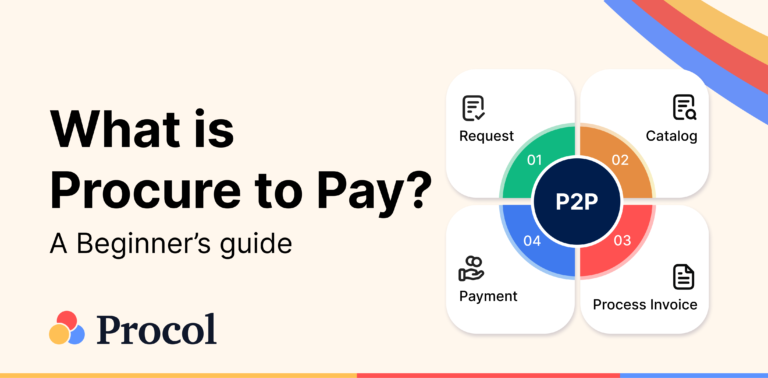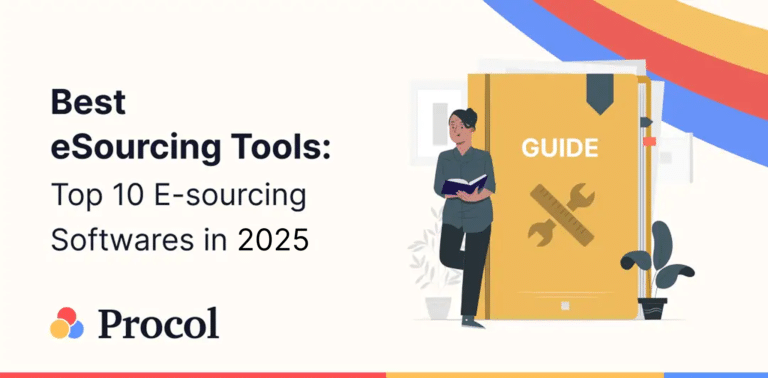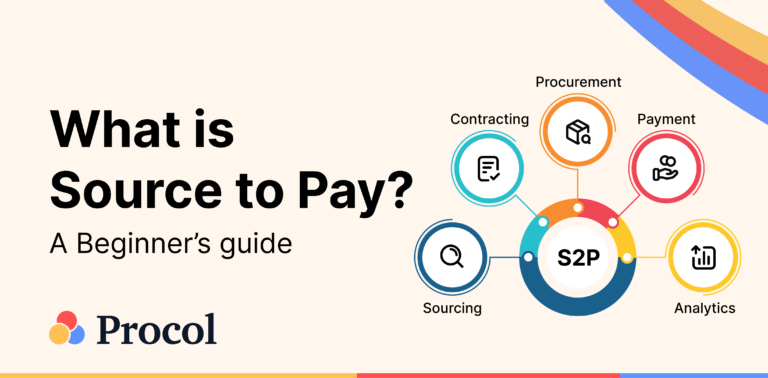Procol • April 15, 2025
Contract Lifecycle Management Software: Essential for Business Success

Effective CLM software is crucial in today’s business world. It streamlines the entire contract lifecycle, from drafting to implementation, ensuring compliance and reducing risks.
Contract Lifecycle Management software empowers businesses to take control of their contracts and accelerate processes. It enables teams to efficiently manage agreements at every stage, instilling confidence and control in their roles.
If your current software isn’t practical, consider upgrading. This guide covers everything you need to know about CLM software.
What is Contract Lifecycle Management?
Contract lifecycle management is the process of handling and managing a contract on one unified platform. It begins with creating the contract and is followed by various steps such as reviewing, negotiating, approving, and finalising the terms.
It helps streamline and automate the process of contract development so your business can conduct contract management efficiently.
What is the best Contract Lifecycle Management Software?
Contract lifecycle management software is a versatile digital platform that revolutionarily affects the contract process. It makes every step more accessible, from the first draft to the final signing and ongoing management. This all-in-one system is a central hub for all contract-related tasks, offering a single solution for different departments. Legal teams gain from its compliance features, finance professionals from its ability to save costs, procurement experts from its smooth workflows, and sales executives from its contract visibility. CLM platform has a significant impact on productivity, cuts down on errors, and gives valuable insights. It’s a vital tool for companies that want to improve their contract management and grow their business.
15 Best Contract Lifecycle Management Software for 2025
In today’s fast-changing world of contract management, companies want better ways to make their work easier. When choosing the best contract lifecycle management software, consider your organization’s size, specific needs, integration capabilities, and budget. Each solution offers unique features catering to different aspects of contract lifecycle management.
Check out these 15 best contract lifecycle management software for 2025:
Procol:
Procol is a full-featured contract management software that helps businesses handle contracts efficiently. This platform gives companies a central place to store all their contract documents, making keeping, finding, and monitoring their agreements easier. Procol offers a comprehensive spending dashboard and readily available templates for creating new orders. Users report significant time savings in PR to PO processes after implementation.
Conga Contracts:
Conga Contracts allows users to tie data from Salesforce directly into contracts. It’s beneficial for organizations with complex product offerings.
Volody:
While specific details about Volody are not provided in the given information, it’s included in the list of top CLM software for 2025.
SignWell:
SignWell is mentioned in the list, but specific details must be provided in the information provided.
SAP Ariba:
Due to its extensive feature set, SAP Ariba is suitable for large organizations. However, smaller organizations require more time to implement it.
Juro:
Juro is the leader in contract automation software. It gives users complete tools to create, execute, and manage contracts. Its AI Assistant helps draft contracts, reducing contract turnaround time by 90%. Juro offers many free contract templates, making it a top pick for legal, sales, HR, finance, and operations teams.
Ironclad:
Ironclad specializes in digital contracting software. It excels at generating, negotiating, approving, signing, and storing contracts. Two features make it stand out. First, it has a native DocX platform that lets users edit and collaborate on DocX files. Second, it boasts an easy-to-use Workflow Designer to create contracts and set up approval processes.
DocuSign:
DocuSign’s CLM software is suitable for companies of all sizes. It has automatic contract workflows that summarize agreements and link with Salesforce. Users also love DocuSign’s e-signature service.
PandaDoc:
PandaDoc’s Essentials package is a cheap option for small firms. You can upload as many documents as you want, sign them, use contract templates, track them in real time, and view document stats.
Evisort:
Evisort uses AI to manage contracts. It helps with writing, negotiating, automating, managing, analyzing, and reporting on contracts. It features a clause library with AI-extracted language from historical contracts and an in-app document editor.
Oneflow:
Oneflow manages the entire contract lifecycle, from pre-signing to post-signing processes. It offers a comprehensive digital contract management solution that streamlines the entire contracting process.
Icertis:
Icertis’s Contract Intelligence platform is ideal for large enterprises. It uses AI techniques to reduce contract drafting, review, and finalization time. Its cutting-edge AI tools include ExploreAI, DiscoverAI, NegotiateAI, and VisualizeAI.
Agiloft:
Agiloft offers three contract management solutions: Essentials, Advanced, and Premium. It’s beneficial for corporate sales teams, allowing the creation of proposals and master service agreements from within Salesforce.
SpotDraft:
SpotDraft offers contract management software. It includes templates, workflows, a repository, reporting, and campaign management.
LinkSquares:
LinkSquares aims to help legal teams. It claims to have the quickest AI-powered CLM platform. Its Finalize feature combines contract drafting with internal processes. Users can fill contract templates with stored clauses in one click.
Key Features of Contract Lifecycle Management Software
A contract lifecycle management system is crucial for modern companies in today’s quick-moving business world. It helps them simplify their contract processes and manage their relationships more effectively.
When companies start using CLM software, they see significant improvements in saving money, working more, and managing risks. This software helps reduce risks by ensuring fewer missed obligations and boosting compliance with legal rules. Moreover, it enables companies to sign contracts faster, gain trust sooner, and maintain visibility into how agreements impact the bottom line.
CLM software typically offers a range of features to support effective contract management:
Centralized Contract Hub:
Scattered contracts become burdens. A unified digital system offers unlimited storage and easy transfer. It enables quick tracking and document linking. A central hub with advanced search saves time.
Digital repositories provide easy access and compliance records. Digitizing and tagging allow swift searches, and companies can monitor key terms, risks, and obligations.
Electronic systems help locate information quickly, give a clear overview, and reduce risks. Centralizing contracts improves efficiency, ensures compliance, and turns scattered documents into an organized resource.
Robust Protection and Regulatory Adherence:
Contracts hold vital company data and require careful management to mitigate risks. When choosing a contract repository, businesses must prioritize strong security measures, including encryption and access controls.
Cloud-based systems offer superior protection compared to paper storage. They use encryption, secure servers, and automatic backups to prevent unauthorized access and data loss, enhancing overall information security.
Advanced Search and Reporting:
Traditional paper-based contract management processes could be more efficient. Contract experts waste time searching for agreements when it should be quick. Modern SaaS contract management tools offer powerful search functions, eliminating manual processes.
The contract lifecycle management system provides contract metadata search and reporting, allowing users to find information quickly and generate reports on key metrics.
These tools store all contract data in a central database, enabling comprehensive search and instant, customized reporting. Contract managers can quickly produce agreement histories, compare details, view status summaries, and check expiration dates in one place.
CLM Integration with Business Tools:
Integrating contract management systems with platforms like Salesforce, MS Word, and Outlook improves accessibility and reduces processing times. Modern SaaS solutions enable easy system integrations, transferring data between CRM, CLM, and other systems for various contract-related tasks.
A unified interface increases productivity and reduces duplicate entries. The contract lifecycle management tool streamlines processes and integrates critical applications to maximize value. Involving sales teams through a shared UI for contract requests, workflows, and updates saves time and reduces reliance on other departments.
AI-Enhanced Contract Lifecycle Management:
The AI-enhanced Contract Lifecycle Management system is a game-changer in the contract management landscape. AI assistants, trained on past contracts, guide the creation of new contracts, suggesting clauses and milestones. Natural Language Processing (NLP) and analytics elevate the contracting process, generating structured documents that meet regulatory requirements. AI-driven CLM platform imports existing contracts and adds metadata tags, providing businesses with a comprehensive view of their contract landscape. This advanced technology significantly boosts productivity and helps manage risks. NLP, a key component of AI, enables computer-human language interaction in text or speech, further enhancing the user experience.
Customizable Dashboards:
Customizable dashboards display key contract metrics, providing quick access to vital data and improving understanding of contract dynamics. Users can monitor finances, duties, usage, and end dates on one screen. This comprehensive view helps businesses optimize processes.
Automation with better visibility allows teams to assess effectiveness, adapt to changes, manage alerts, monitor access, measure performance, and improve workflows. It also clarifies contract revenue and value, highlighting unfulfilled terms or renewal needs.
Powerful Search Capabilities:
Provide comprehensive full-text search functionality, enhanced by advanced OCR (Optical Character Recognition) scanning and intelligent indexing. This helps users find contracts and related papers, saving time and improving things. The system can look through text and scanned pictures to get all the essential info.
Real-time Status Tracking:
Real-time status tracking is a crucial feature of the best Contract Lifecycle Management software. It significantly accelerates the contract execution process by incorporating robust e-signature capabilities. With live tracking, users can receive instant updates on the status of signatures, facilitating quick follow-ups and faster deal closures. This feature is a practical tool for businesses looking to expedite their contract processes.
Negotiation Support:
Enhances the negotiation process by providing tools and insights that help parties reach mutually beneficial agreements. This feature aids in clearly defining expectations and outlining potential remedies in case of contract breaches, fostering smoother negotiations.
Automated Review and Approval:
This system implements intelligent, rule-based workflows for efficient contract review and approval. It supports sequential and parallel approval processes and adapts to organizational structures and requirements.
Performance Monitoring:
Utilizes advanced AI technology to analyze contract language and continuously monitor ongoing contract performance. This proactive approach helps identify potential issues before they escalate.
Expiry and Renewal Management:
This feature provides timely alerts and notifications for crucial contract milestones, including expiry dates and renewal deadlines. It ensures that essential dates are always noticed, helping maintain business continuity.
How Does Procol’s CLM Software Help Businesses?
Procol’s contract lifecycle management tool helps you track all contracts and their nitty gritty in one place. Whether it is approvals or negotiations, Procol offers pre-designed workflows that you can adapt to your business as it is. You can also customize workflows to the suitability of your business. Here are some advantages that you get if you choose Procol’s CLM software:
Detailed tracking: You can get detailed insights and reports of every contract that is made on the contract management system. This will helps you analyse the date and identify areas that need improvement and thereby enhance the overall process of contract development.
Complete visibility of every step: Procol gives you complete visibility and bird-eye view of the contract management process.It also helps you gain a microscopic view so you cna track the pace at which the CLM process takes place.
Speedy approvals: With Procol’s CLM software you can get approvals done in no time as all stakeholders are notified when it’s their turn to approve the document. You can track everything on a mobile-first app to avoid errors.
How does CLM Software Help Businesses?
Contract lifecycle management software makes the contract process smoother. This process often needs more cohesion and efficiency. Many companies use different tools to draft, share, sign, store, and monitor contracts. This approach causes friction and leads to data loss.
CLM software brings all these steps into one unified workspace, eliminating the need to switch between platforms. This reduces administrative tasks and protects contract data.
A contract lifecycle management system simplifies the process by offering a comprehensive contract management process in a single platform.
How to choose a CLM software for your business?
To ensure that you choose the most suitable CLM software for your business, you need to ensure that you first list down some important factors. The essential factors to consider while making this decision are pain points in your existing contract process, size of your organisation, volume of contracts handled by your organisation on a monthly basis and many more.
Listed here are some of these factors in detail:
Integration capabilities: An ideal contract lifecycle management software will help you integrate it with your existing systems easily and seamlessly. Most suitable CLM tools usually offer a zero-code or low-code solution so you do not spend much on developer cost.
Employee support and training: A suitable and appropriate CLM software will offer adequate post-sale support to help you drive speed of employee adoption. This will also help you automate your contract development process faster. The right CLM software company will help you with demo sessions and pre-recorded orientation sessions, so your team can get the hang of the platform as soon as possible.
Business priorities and pain points: Before you even begin researching the ideal CLM software, you first need to sit with your team and identify the pain points and challenges they face in the current contract management system. Only when you have the list of issues faced by the team will you be able to identify exactly what you need to look for in a CLM software that is most suited to your business.
Advanced functionalities offered by platform: If you function within an industry that has specific contract development and management requirements then you need to identify CLM tools that offer exactly those additional features. It is important that you choose a CLM system that offers advanced features and pre-developed industry-specific use cases that you can learn from and adopt as and when needed.
User interface and experience: One of the most significant factors in driving employee adoption of your chosen and implemented CLM software is its user experience. A platform with friendly UX and UI is bound to be adopted and picked up faster by employees. This will mean faster integration and usage of platforms for automated and efficient contract management.
Hence, these are the essential parameters that you need to look at while choosing a CLM software for your company.
Conclusion
The contract lifecycle management system streamlines how businesses handle agreements. It boosts efficiency, cuts costs, and reduces risks. This guide explores contract lifecycle management tool features and benefits, listing top solutions for 2025 to help organizations choose the right system.
The best contract lifecycle management software can transform contract management, enabling faster signing and better oversight of agreements’ financial impact. Contract lifecycle management software is becoming essential for companies aiming to excel in managing contractual relationships as business evolves.
Frequently asked questions
Is CLM software important for my business?
Yes, a CLM software is important for your business mainly because it offer an automated process for contract development and management. It also enables you with speedy approvals so you do not waste too much time on mundane and clerical processes.
Is it expensive to install a CLM tool for my business?
No, it is ideally not very expensive to install CLM software, especially when you consider the advantages you get after installing the system. The benefits a CLM tool brings to the table are far more in value than the amount you will invest in it.
Which is the best CLM software?
There are many options available in the market if you intend to automate your contract lifecycle management process. Some of these are Concord, Ironclad and Procol. While most of them offer similar features, you can first decide your business priorities and then finalise the platform you wish to go for.
Explore more from Procol
Discover expert tips, how-to guides, industry insights, and the latest procurement trends.

What is Procure-to-pay (P2P)? An Ultimate Guide
Procure to pay is the process from procurement of materials needed...

Best eSourcing Tools: Top 10 eSourcing Software in 2025
Discover top 10 e-sourcing tools and esourcing platforms necessary for efficient...

What is Source-to-pay in 2025? An Ultimate Guide
Source to pay is the process of sourcing vendors to procure...







